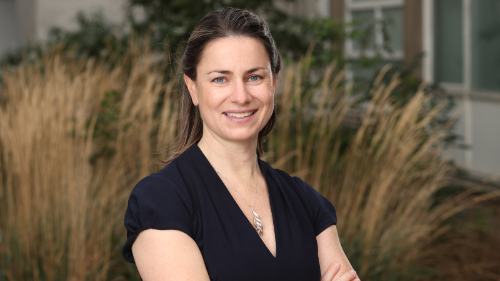New study shows high response rates and good clinical outcomes provided by T-Dxd in the treatment of people with advanced HER2-positive breast cancer
Wednesday, 25 September, 2024
Share

 Congratulations to UCD School of Medicine’s Professor Michaela Higgins on her recently published paper in (opens in a new window)Nature Medicine.
Congratulations to UCD School of Medicine’s Professor Michaela Higgins on her recently published paper in (opens in a new window)Nature Medicine.
This study, the DESTINY-12 clinical trial, involved multiple authors and spanned several countries.
The UCD Cancer Trials Cluster contributed more patients to this study than any other Irish site and this contribution has been marked by co-authorship for Professor Higgins in the academic article.
The important study confirmed very high response rates and good clinical outcomes provided by T-Dxd (trastuzumab deruxtecan) in the treatment of people with advanced HER2-positive breast cancer, particularly in patients with brain metastases.
HER2-positive breast cancer, a more aggressive subtype, accounts for around 15-20% of all breast cancer cases. Unfortunately, up to half of patients with advanced disease develop brain metastases, which significantly worsens their prognosis.
The DESTINY-12 clinical trial is the largest prospective study to date focusing on the use of T-DXd in this patient group. The trial involved two groups of patients: one with brain metastases (263 patients) and another without brain metastases (241 patients). All participants had previously received at least one round of anti-HER2 therapy before starting the trial T-DXd treatment.
Professor Michaela Higgins, study author, UCD School of Medicine Clinical Professor and UCD Cancer Trials Cluster Director, notes, “We have demonstrated that T-Dxd is an extremely active treatment for patients with HER-2 positive, advanced breast cancer and brain metastases. The treatment does come with significant potential side effects which we are becoming expert at managing. I am grateful to the wonderful patients and their families who took part in this important study which will guide treatment for future breast cancer patients. I am also proud of our team of research nurses who took tremendous care of all our patients and data managers who collated the study data efficiently and accurately”.
Well done to all involved.
Read the full paper (opens in a new window)here.